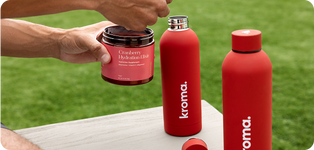Menopause is a seismic biological shift that impacts half of humanity. And while every woman knows this transition awaits, few are prepared when it hits. Not helping matters: Until very recently, the milestone of menopause— marked by the absence of menstruation for 12 consecutive months— was viewed culturally as a time of loss and limitation… something to be endured, not embraced.
The truth is, there are considerable physical and emotional obstacles to navigate, but being armed with the right knowledge and support can ease the discomfort, anxiety and identity crisis many women experience and usher in a vibrant phase of life.
In fact, menopause is going through a much-needed rebrand thanks to outspoken mid-life celebs such as Gwenyth Paltrow and Naomi Watts, an increasing number of doctors specializing in menopause medicine, experts who are widely sharing menopause education on social media and millions of women (maybe you!) who refuse to suffer shame or acquiesce to symptoms such as weight gain, fatigue, brain fog, hot flashes, insomnia, lack of libido, depression, anxiety and more.
Also worth noting: Though the median onset age of menopause is 51, the hormonal shifts of perimenopause often begin to surface in the 30s and 40s.
Now, for the advice and resources you’ve been searching for:
Find a Physician to Help You Thrive:
When it comes to menopause, many doctors are out of their depth. As of 2018, in the United States, 80% of medical residents reported feeling “barely comfortable” discussing or treating menopause, and only 20% of OB/GYN residency programs provide menopause training.
So, it’s up to you to find a doctor who is versed in your shifting needs and willing to do the blood tests and ongoing evaluation necessary to form a treatment plan.
Functional medicine doctors who practice a more holistic, root-cause form of healthcare that considers dietary and lifestyle factors such as stress and activity levels, are often better equipped to address both symptoms and long-term health risks such as joint pain, cognitive decline, heart disease, osteoporosis, and more that can accompany the decline of hormone production.
Also, menopause-focused telemed companies such as Alloy Health are filling the gap nationally with counseling, hormone replacement therapy (HRT) and more.
Eat to Thrive
What you eat plays a key role in your hormonal health and, therefore, how you experience menopause. Dr. Mary Claire Haver, author of The New Menopause, advocates for an anti-inflammatory diet to support women through menopause by reducing symptoms such as weight gain and fatigue. She encourages women to focus on whole foods, lean proteins, healthy fats, and fiber to help manage inflammation and promote hormonal health during menopause.
Here's what to prioritize:
- Protein: As estrogen levels drop, muscle mass declines. To preserve muscle and support metabolic function, increase your intake of protein sources like fish, poultry, lean beef and plant-based proteins such as tofu, tempeh, nuts and Kroma’s High Protein Bundle.
- Calcium and Vitamin D3/K2: With a higher risk of osteoporosis during menopause, these nutrients become essential. Incorporate calcium-rich foods like leafy greens, tofu, almonds and fortified plant milks, and get enough vitamin D through controlled sun exposure or a supplement. It’s a good idea to get your Vitamin D levels checked at least annually, but ideally more frequently.
- Omega-3 Fatty Acids: Found in fish such as salmon, mackerel and sardines, as well as flaxseeds, chia seeds and walnuts, omega-3s help reduce inflammation and may ease menopausal symptoms like hot flashes and mood swings. You can take a high-quality fish oil or algae oil supplement.
- Magnesium: This mineral can improve sleep, reduce stress, regulate bowel movements and support bone and muscle health. It’s hard to get adequate amounts through food, so supplementing with products such as Kroma’s Calming + Restore Magnesium beverage is your best bet.
Extra credit supplements:
- Collagen: This protein supports skin elasticity and may reduce the appearance of aging as skin tends to lose firmness with estrogen decline— precisely why it’s included in Kroma’s Beauty Matcha. Some studies also suggest that collagen can improve joint health.
- Methylated B Vitamins: Vital for energy and cognitive health, B vitamins support metabolic function and can help reduce the fatigue often associated with menopause.
- Creatine (3-5 grams/day): Creatine can support muscle growth and bone density, especially as we age. Additionally, creatine has potential cognitive benefits, and may reduce mental fatigue.
Minimizing alcohol is also key because it can exacerbate symptoms like hot flashes, night sweats and other sleep disturbances—plus, contribute to weight gain and increase your risk of breast cancer. So moderate your drinking and hydrate at the same time with a fun mocktail like this one.
Move to Strive
Strength-training is important at any age, but as women near and enter menopause, building muscle mass becomes crucial. The gradual loss of muscle mass, strength and function, referred to as sarcopenia, is a common condition that is progressive,” says Dr. Haver, and, “the amount of muscle mass we have defines our basal metabolic rate – or the rate at which we burn calories at rest.” So if you’ve exclusively been a calorie-burning cardio queen, know this: lean muscle burns more calories at rest! Strength training also builds bone density, which is protective during menopause when osteoporosis risks increase.
Here are the movements to make:
- Strength/Resistance Training: Incorporate weights, resistance bands and bodyweight exercises into your routine at least three times a week. Note: Do not skip the weights— you need to lift progressively heavier weights to stimulate meaningful muscle growth.
- Flexibility and Balance: Pilates, yoga, tai chi and stretching routines will help you maintain mobility and reduce the risk of falling and injury.
- Cardio Your Body Likes: Cardio is still important— the kind you do depends on how you feel. If your joints don’t hurt, running is fine. If they do, walking, swimming and cycling may put less stress on them. Short intervals of intense cardio help with insulin sensitivity and blood sugar levels. Dancing counts too!
Reduce Stress to Thrive
Estrogen typically helps lower the impact of stress on the body, so lower estrogen levels during menopause may reduce the body's ability to manage stress as effectively. Stress can also exacerbate menopausal symptoms such as hot flashes and insomnia.
It’s never too early to find and utilize consistent stress-reduction practices to promote hormonal balance and overall well-being.
A few science-backed ways to reduce stress:
- Mindful Practices: Incorporate stress-reducing techniques like meditation, breathwork, journaling, listening to binaural beats and more.
- Adequate Sleep: Sleep disruptions are common during menopause, but prioritizing good sleep hygiene—like a consistent bedtime and minimizing screen time before bed—can improve sleep quality and reduce stress.
- Adaptogenic ingredients: Adaptogens like ashwagandha, maca and rhodiola can support the body’s stress response and help regulate cortisol levels.
By managing stress proactively, you’ll be able to handle hormonal shifts with more grace, reducing the negative impacts on your body and mind.
Use Your Mind to Thrive
Finally, and maybe most importantly, is your mindset. Menopause is not an end—it's a powerful beginning. Think about it: By this point, you have decades of experience, wisdom and strength to draw upon. “Aging doesn’t mean losing vitality; it’s about stepping into your power, both mentally and physically,” asserts Tamsen Fadal, an award-winning TV news anchor, podcast host, menopause TikTok star and now documentarist of the menopause film The M Factor.
Empowering yourself with knowledge and self-care strategies can shift your mindset from feeling out of control to owning this transformative phase.
- Find Community: Connect with others going through the same transition to share stories, challenges and victories. Join The Swell, a community and learning platform for 40+ women, and watch Tamsen Fadal’s documentary, The M Factor, with a group of friends.
- Build Your Toolkit: Follow and connect with the experts in the space who are sharing resources to help women prepare for and navigate this transition. Listen to the She MD podcast, pick up a copy of Dr. Mary Claire Haver’s book, The New Menopause, and check out the online portal Alloy to help navigate symptom treatments. (more resources below)
Taking control of your mental and physical health during menopause is an ongoing process that includes nourishing your body, moving with intention, managing stress, and adopting a mindset that celebrates your age. While it may signal the end of fertility, it certainly doesn’t mark the end of vitality. Instead, it offers a chance to reset, realign, and rediscover your power.
RESOURCE GUIDE
Aging is inevitable, but longevity is not. Making simple changes to your diet by adding nutrient-dense foods can help you improve your longevity and age gracefully. Maintaining a balanced diet is a common factor in people who live long, healthy lives.
You can support your longevity by adding healthy fats, daily greens, herbs and spices, and plant protein to your daily meals. If you want to reset your diet, we have a 5-day Lifestyle Reset that can help you shift your nutritional goals and start feeding your body the nutrients it needs. Supporting your gut health through the foods you eat may also support your ability to age gracefully.
Kroma Wellness believes in the power of nutritious food, which is why we aim to bring you healthy, superfoods in convenient packaging, so you can feed your body what it needs at any time.



